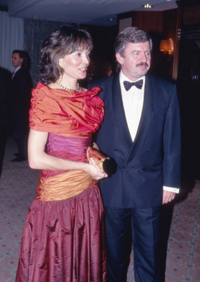Martin Beiter: Difference between revisions
Neuleinster (talk | contribs) |
Neuleinster (talk | contribs) |
||
| Line 171: | Line 171: | ||
The term ''"Heir of the Besmenian Empire"'' is nowadays a well-known satirical term for Robert Gleitzmann. The 1980 election campaign is now considered to be one of the wildest in the Federal Republic history. | The term ''"Heir of the Besmenian Empire"'' is nowadays a well-known satirical term for Robert Gleitzmann. The 1980 election campaign is now considered to be one of the wildest in the Federal Republic history. | ||
===Prime Minister of Besmenia=== | ===Prime Minister of Besmenia=== | ||
====First term (1980-1981)==== | |||
[[File:Martin Beiter 1981 CCA.png|200px|thumb|left|Beiter signing the Besmenia-CCA contract in his office on May 25, 1982]] | [[File:Martin Beiter 1981 CCA.png|200px|thumb|left|Beiter signing the Besmenia-CCA contract in his office on May 25, 1982]] | ||
In the 1980 election campaign, Beiter rejected a coalition with the BVP and advocated a coalition with the SDU. After the [[1980 Besmenian federal election|1980 election]], however, there was no majority for an FBBP-SDU coalition. After talks with [[President|President | In the 1980 election campaign, Beiter rejected a coalition with the BVP and advocated a coalition with the SDU. After the [[1980 Besmenian federal election|1980 election]], however, there was no majority for an FBBP-SDU coalition. After talks with [[President of Besmenia|President]] [[Erwin Pohl]], Beiter formed a minority coalition between the FBBP and the SDU in October 1980, with the requirement for new elections in May 1981. | ||
====Second term (1981-1985)==== | |||
In April 1984, Beiter presented a six-point program for the legislative period 1984-1988. It outlined planned goals and efforts in the areas of labor market, foreign policy, research and innovation, energy policy, financial policy and social policy. | |||
====Third term (1985-1989)==== | |||
====Fourth term (1989-1991)==== | |||
==Assassination and state funeral== | ==Assassination and state funeral== | ||
Revision as of 06:24, 17 December 2021
Martin Beiter | |
|---|---|
| File:Martin Beiter4.png Beiter in 1981 | |
| 9th Prime Minister of Besmenia | |
| In office 6 October 1980 – 5 May 1991 | |
| Preceded by | Robert Gleitzmann |
| Succeeded by | Kurt Stöger |
| Leader of the Free Besmenian Citizen's Party | |
| In office 22 March 1980 – 5 May 1991 | |
| Preceded by | Jürgen Rothmann |
| Succeeded by | Heinz Maurich |
| Leader of the Free Besmenian Citizen's Party in the Federal Chamber | |
| In office 22 March 1978 – 1 September 1980 | |
| Preceded by | Roland Wasste |
| Succeeded by | Heinz Preiung |
| Member of the Federal Chamber | |
| In office 4 September 1972 – 5 May 1991 | |
| Personal details | |
| Born | Martin Beiter 10 January 1945 Brütheim, Trissa, East Besmenia |
| Died | 5 May 1991 (aged 46) Melmingia, Maurenmark, Besmenia |
| Manner of death | Assassination |
| Political party | Free Besmenian Citizen's Party |
| Spouse | Astrid Schmid (m. 1976) |
| Children | 2 |
Martin Beiter (10 January 1945 - 5 May 1991) was a Besmenian politician who served as Prime Minister of Besmenia from 1980 until his death in 1991. He also was party leader of the Free Besmenian Citizen's Party from 1980 to his death. Beiter is the youngest prime minister ever, when he took office, he was 35 years old.
Beiter was assassinated on May 5th, 1991 in an restaurant after a election campaign for the 1991 Maurenmark state election in Melmingia. His death caused mourning among the population.
Early Life and Childhood
Martin Beiter was born on January 10, 1945 as the son of the entrepreneur Leopold Beiter (1904-1989) and the housewife Greta Helbeing (1907-1994) in the East Trissian village of Brütheim.
Education
After graduating in 1961 with a secondary school diploma (Hauptschulabschluss), Beiter began training as a salesman.
Political career
During his time as a salesman, Beiter became more and more interested in politics and in 1965 he joined the Free Besmenian Citizen's Party. From 1966 on, Beiter worked in the FBBP district association of Brütheim.
Member of the Federal Chamber
Beiter won a seat for the 14th Besmenian Federal Chamber on the Trissian FBBP's state list in the 1972 Besmenian federal election. During his time as a member of parliament, he was particularly known as an excellent speaker and opponent of the blue-orange coalition led by Robert Gleitzmann. He found high recognition among senior FBBP politicians such as Jürgen Rothmann (FBBP party leader, 1968-1980) and Günther Traubert (Vice President of the Federal Chamber, 1976-1980). After the resignation of the chairman of the FBBP parliamentary group in the Federal Chamber Roland Wasste, Beiter was appointed his successor.
FBBP party leader and candidate in the 1980 election

After Jürgen Rothmann announced on July 10, 1979 that he would resign from the FBBP party chairmanship in 1980 and not run as candidate for prime minister for the 1980 election, on July 15, 1979, during a press conference, Beiter announced that he would be for the office of FBBP federal chairman to apply. He competed against Theoberg Braun and Georg Wallmann. The election took place at the FBBP convention on March 22, 1980. With around 532 out of a total of 970 votes, Beiter achieved an absolute majority and was thus elected as the new party chairman and prime minister candidate of the FBBP.
The 1980 election campaign was dominated by the feud between Beiter and Gleitzmann. Beiter criticized Gleitzmann's resistance to Besmenian's accession to the Coalition of Crown Albatross, while Gleitzmann criticized Beiter for being too young.
In a television debate on July 20, 1980, after a brief conflict, Beiter said to Gleitzmann: "You, my dear Mr. Gleitzmann, you are an heir of the Besmenian Empire! You are engaging in business with a party that actually shows some tendency to Ochsenbeinism and that after the West Besmenians were happy to have been freed from Ochsenbeinism in 1966. Aren't you ashamed of that?"
The term "Heir of the Besmenian Empire" is nowadays a well-known satirical term for Robert Gleitzmann. The 1980 election campaign is now considered to be one of the wildest in the Federal Republic history.
Prime Minister of Besmenia
First term (1980-1981)
In the 1980 election campaign, Beiter rejected a coalition with the BVP and advocated a coalition with the SDU. After the 1980 election, however, there was no majority for an FBBP-SDU coalition. After talks with President Erwin Pohl, Beiter formed a minority coalition between the FBBP and the SDU in October 1980, with the requirement for new elections in May 1981.
Second term (1981-1985)
In April 1984, Beiter presented a six-point program for the legislative period 1984-1988. It outlined planned goals and efforts in the areas of labor market, foreign policy, research and innovation, energy policy, financial policy and social policy.
Third term (1985-1989)
Fourth term (1989-1991)
Assassination and state funeral
The state funeral took place on May 28, 1991 in Laitstadt with around 1000 guests, including the Zamastanian President Cassious Castovia.
Political position
Beiter was considered a staunch left-wing liberalist. He united liberal positions and also positions of the center-left. During his membership in the FBBP he belonged to the left-wing liberal wing.
Personal life
Beiter married the writer Astrid Schmid in 1976. Both had known each other since 1973. The couple had a boy, Christoph Beiter (born 12 December 1978), and a daughter, Franziska Beiter (born 10 October 1983).
The couple had owned a weekend house in the Summingian forest since 1977, where the couple often spent their holidays and often invited guests.
Beiter was very interested in art. He had some of his favorite paintings hung in his office in the Federal House.
Legacy

Today Martin Beiter is considered as one of the most influential Prime Ministers of Besmenia, alongside with Heinz Dimmler and Johannes Schmidt. In 2001, Martin Beiter was identified as the most popular politician in recent Besmenian history in a poll by an opinion research institute.
Personality and media portrayals
Satirical representation
Beiter was often the subject of satire and caricature. Here recurring remarks were his young age, his aversion to the BVP and BRP and his mustache, which is often referred to as Porn bar (Pornobalken).
Honors
Besmenian honors
Foreign honors
Honorary citizen
1981: Brütheim
1987: Laitstadt
1990: State of Trissa
Namesakes
- Various roads, public facilities and schools
- Martin Beiter Tower in Laitstadt
- Martin Beiter Barracks in Brütheim

